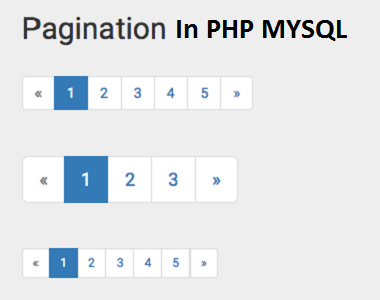Hi Geeks,
We have gone through some user requests for pagination code for php mysql project.So we have created a simple class where you can easily create pagination for any grid or listing. following are the simple steps for making a pagination system in php.
Step 1: Create a class file ‘Paginator.class.php’ in your project with following code snippet
|
1 2 3 4 5 6 7 8 9 10 11 12 13 14 15 16 17 18 19 20 21 22 23 24 25 26 27 28 29 30 31 32 33 34 35 36 37 38 39 40 41 42 43 44 45 46 47 48 49 50 51 52 53 54 55 56 57 58 59 60 61 62 63 64 65 66 67 68 69 70 71 72 73 74 75 76 77 78 79 80 81 82 83 84 85 86 87 88 89 90 91 92 93 94 95 96 97 98 99 100 101 102 103 104 105 106 107 108 109 110 111 112 113 114 115 116 117 118 119 120 121 122 |
<?php class Paginator { private $_conn; private $_limit; private $_page; private $_query; private $_total; public function __construct( $conn, $query ) { $this->_conn = $conn; $this->_query = $query; $rs= $this->_conn->query( $this->_query ); $this->_total = $rs->num_rows; } public function getData( $limit = 10, $page = 1 ) { $this->_limit = $limit; $this->_page = $page; if ( $this->_limit == 'all' ) { $query = $this->_query; } else { $offset=( ( $this->_page - 1 ) * $this->_limit ); $query = $this->_query . " LIMIT " . $offset . ", $this->_limit"; } $rs = $this->_conn->query( $query ); $results=array(); while ( $row = $rs->fetch_assoc() ) { $results[] = $row; } $result = new stdClass(); $result->page = $this->_page; $result->limit = $this->_limit; $result->total = $this->_total; $result->data = $results; return $result; } public function append_existing_query_string($qstring) { if(isset($_GET)) { foreach($_GET as $k=>$v) { $qstring.="&".$k."=".$v; } } return $qstring; } public function createLinks( $links, $list_class ) { if ( $this->_limit == 'all' ) { return ''; } $last = ceil( $this->_total / $this->_limit ); $start = ( ( $this->_page - $links ) > 0 ) ? $this->_page - $links : 1; $end = ( ( $this->_page + $links ) < $last ) ? $this->_page + $links : $last; $html = '<ul class="' . $list_class . '">'; $class = ( $this->_page == 1 ) ? "disabled" : ""; // $qstring='?limit=' . $this->_limit . '&page=' . ( $this->_page - 1 ); $qstring=$this->append_existing_query_string($qstring); // $html .= '<li class="' . $class . '"><a href="'.$qstring.'">«</a></li>'; if ( $start > 1 ) { // $qstring='?limit=' . $this->_limit . '&page=1'; $qstring=$this->append_existing_query_string($qstring); // $html .= '<li><a href="'.$qstring.'">1</a></li>'; $html .= '<li class="disabled"><span>...</span></li>'; } for ( $i = $start ; $i <= $end; $i++ ) { $class = ( $this->_page == $i ) ? "active" : ""; // $qstring='?limit=' . $this->_limit . '&page=' . $i; $qstring=$this->append_existing_query_string($qstring); // $html .= '<li class="' . $class . '"><a href="'.$qstring.'">' . $i . '</a></li>'; } if ( $end < $last ) { $html .= '<li class="disabled"><span>...</span></li>'; // $qstring='?limit=' . $this->_limit . '&page=' . $last; $qstring=$this->append_existing_query_string($qstring); // $html .= '<li><a href="'.$qstring.'">' . $last . '</a></li>'; } $class = ( $this->_page == $last ) ? "disabled" : ""; $qstring='?limit=' . $this->_limit . '&page=' . ( $this->_page + 1 ); $qstring=$this->append_existing_query_string($qstring); $html .= '<li class="' . $class . '"><a href="'.$qstring.'">»</a></li>'; $html .= '</ul><span style="float:right;color:blue">Total records : '.$this->_total.'</span>'; return $html; } } ?> |
Step 2: Include the paging class before extracting data to show
|
1 2 3 4 5 |
<?php include 'Paginator.class.php'; ?> |
Step 3: Now extract the data for any page as following
|
1 2 3 4 5 6 7 8 9 10 11 12 13 14 15 16 17 18 19 20 21 22 |
<?php //create a connection to mysql $conn = new mysqli('SERVER HOST NAME','MYSQL USER NAME', 'MY SQL USER PASSWORD','PROJECT DATABASE NAME' ); //DEFINE LIMIT for PER PAGE now 25 is page limit $limit = ( isset( $_GET['limit'] ) ) ? $_GET['limit'] : 25; //DEFAULT PAGE NUMBER if No page in url $page = ( isset( $_GET['page'] ) ) ? $_GET['page'] : 1; //Number of frequency links to show at one time ; $links = ( isset( $_GET['links'] ) ) ? $_GET['links'] : 7; //your query here in query varriable $query = "Select * from customers "; //create a paging class object with connection and query parameters $Paginator = new Paginator( $conn, $query ); //get the results from paginator class $results = $Paginator->getData( $limit, $page ); ?> |
Step 4 : Now we are ready with data. So just showing the data and links as following
> Show the data first and after it showing the pagination links as following:
|
1 2 3 4 5 6 7 8 9 10 11 12 13 14 15 16 17 18 19 20 21 22 23 24 25 26 27 28 29 30 |
<table class="table table-striped"> <thead> <tr> <th>Customer Id</th> <th>Customer Name</th> <th>Customer Email</th> <th>Customer Address</th> </tr> </thead> <tbody> <?php if(isset($results) && count( $results->data ) > 0){ for( $i = 0; $i < count( $results->data ); $i++ ) { ?> <tr> <td><?php echo $results->data[$i]['id']; ?></td> <td><?php echo $results->data[$i]['name']; ?></td> <td><?php echo $results->data[$i]['email']; ?></td> <td><?php echo $results->data[$i]['address']; ?></td> </tr> <?php } } ?> </tbody> </table> |
> Show the paging links after the data

